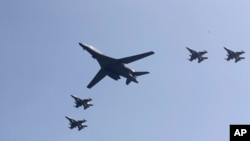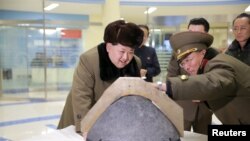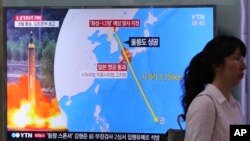South Korea's president says military action against North Korea’s nuclear and missile threats cannot be carried out on the Korean peninsula without his government’s consent, but former U.S. military commanders and analysts have a different reading of the situation.
For weeks, tit-for-tat threats exchanged by U.S. President Donald Trump and the Kim Jong Un regime have made it appear a direct conflict is possible. Through it all, however, South Korean President Moon Jae-in has said he would stand in the way of another battle on the peninsula, where a state of war has technically remained in effect since the 1950-53 Korean War, which ended in an armistice, not a peace treaty.
According to Moon, who has long advocated engagement and outreach to Pyongyang, “Military action on the Korean peninsula can only be decided by South Korea, and no one else can decide on a military action without South Korean agreement."
Trump, however, has not ruled out unilateral military action by the United States, if necessary to prevent the Kim regime from using the nuclear-tipped intercontinental ballistic missiles it claims to have in an attack against the U.S. mainland. North Korea test-launched two ICBMs last month, and recent published reports in the West suggested Pyongyang's engineers successfully fabricated nuclear warheads small and robust enough to be carried as a missile's payload.
US does not doubt Moon's support
"The United States retains the authority, capability and responsibility to defend itself from attack by anyone, including North Korea,” retired four-star Army General Burwell Bell told VOA Korean. Bell commanded U.S. forces in Korea from 2006-08.
Because the U.S.-South Korea defense treaty was signed in 1953, when the only direct threat Pyongyang posed was to Seoul, not Washington, Bell said, the current situation - a potential attack by the Kim regime on the U.S. mainland - can only be addressed outside the framework of that 64-year-old agreement.
“In accordance with international law, the United States would not need South Korean approval [or] cooperation to strike the North with our own off-shore military assets,”the general said. "These assets could be launched from the continental United States, Hawaii, Alaska, Guam and on the high seas near North Korea.”
However, Bell added: “I don’t believe for a second President Moon would consider not supporting the United States.”
Retired U.S. Army General James Thurman, who commanded U.S. Forces Korea from 2011 to 2013, pointed out that, despite the agreements between South Korea and the U.S., any nation has “an inherent right” to protect its sovereign territory. Therefore, he said, the U.S. could take action without consulting South Korea in the event that North Korea fires a missile toward the U.S. territory of Guam, for example.
Advance consultation expected
Kim's regime has explicitly threatened to use its missile firepower against Guam.
“We don’t need approval of any kind to defend ourselves. If we are engaged, we have an inherent right of self-defense, just like the South Koreans,” Thurman said.
David Maxwell is another U.S. military expert who questioned President Moon’s comment that the U.S. must have his government’s approval for military action against Pyongyang.
Maxwell, a retired colonel who commanded Army special forces units, cited Article III of the U.S.-South Korea Mutual Defense Treaty, which states that in case of an armed attack in the Pacific area on either U.S. or South Korean territories, each nation would “act to meet the common danger in accordance with its constitutional processes.”
“Note that U.S. constitutional processes do not include getting approval from an ally to take necessary action to defend the U.S.,” said Maxwell, now an associate director for Georgetown University’s Center for Security Studies. “If the U.S. believes that North Korea is going to launch an attack on U.S. territory and determines that it is necessary to take action to defend the U.S. and its people, then the U.S. can and will take action, either without consultation or if South Korea disapproved.”
'Immediate response' is key
From both practical and moral perspectives, however, Maxwell said Washington would certainly consult in advance with Seoul before acting against Pyongyang, for the sake of combined forces' readiness but also, and more importantly, to prepare for the likely catastrophic consequences of a counterattack by the North.
Bruce Bennett, a defense researcher at the RAND Corporation, said immediate response is one of the basic principles of proactive deterrence in modern warfare.
“If North Korea fires a ballistic missile at Guam and hits Guam, it will be essential for the U.S. government to respond in a time-urgent manner to convince the North Koreans not to repeat such an action, and perhaps to take away the North Korean capability to repeat such an action,” Bennett said.
Some analysts believe it would be inconceivable for the United States not to win South Korea's consent before striking North Korea, given the strong alliance Washington and Seoul have long maintained.
“The United States and South Korea are close allies sworn to uphold each other’s security, and certainly the U.S. is committed to South Korea’s security on the peninsula,” said Michael O'Hanlon, director of research and foreign policy program at the Brookings Institution. “As such, it makes little sense for America to propose or take independent action against North Korea, given how dramatically such action could implicate and endanger South Korean territory.”
Extreme circumstances could perhaps drive the U.S. to take unilateral military action, O'Hanlon said, but he feels that is highly unlikely.
Jenny Lee contributed to this story, first reported by VOA Korean.






